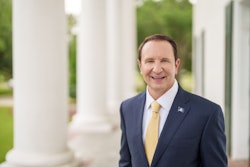If you speak it into the world, it just might happen.
That’s how Dr. Carrie Besnette Hauser became president of Colorado Mountain College (CMC) in 2013. Hauser had always admired the institution because of its unique, tax-based funding, its open-access dual-mission purpose, and its location, nestled into the scenic western slope of the Rocky Mountains. She had once told the former president of Metro State University of Denver, Dr. Stephen M. Jordan, that she would consider becoming a university president if she could lead CMC. When the job opened up, he nominated her for the role, and the rest is history.
 Dr. Carrie Besnette Hauser
Dr. Carrie Besnette Hauser
Now, 11 years later, Hauser’s influence on the institution is clear. She’s solidified the administration, faculty, and staff, which was previously prone to attrition. She’s researched the needs of the local, tourist-driven economies that surround CMC’s 11 campuses. She connected the dots and realized that CMC was losing students by not recruiting more of its regional K-12 students and their families, many of whom are Latinx, first-generation, and immigrants.
That’s why she set about the process of focusing CMC into becoming a Hispanic-Serving Institution. It took just under seven years of deliberate efforts, including phazing out developmental education and leaning into dual enrollment, but eventually CMC’s Latinx student representation grew from 14% to 30%.
“We’re often rural, and if we don’t offer the programs students have to leave or — more often — they bypass the degree. If we didn’t offer it to people in our region, they probably won’t go someplace else to get them,” says Hauser, adding that, due to the remoteness of the region, CMC is often the only local choice for any postsecondary education.
CMC’s campuses are typically far apart, mountains away from each other. But under Hauser’s leadership, the administration, faculty, and staff of these institutions feel more like one team, brought together with a shared brand and message, says Yesenia Silva Estrada, executive director of Strategic Initiatives at CMC.
“I noticed when [Hauser] came, she knew this was a magical place, and everyone needed to know about it,” says Estrada, adding that Hauser set a “north star” in place for everyone at CMC.
“Brand cohesion, unifying mission and vision, getting to the essence of who the college is and who we’re responsible to, that shifted a lot,” says Estrada.
Estrada attended CMC for her associate degree. At the time that she matriculated, a bachelor’s degree was not yet available.
“For someone who has grown up in these central mountain regions, as a Latino, immigrant, first-gen student graduate of this institution, it’s allowed me to have a whole sense of gratitude for her leadership,” says Estrada. “I love CMC. It has truly become a family. In many ways, she has set out the possibilities of what CMC can be.”
Hauser’s dedication to serving local needs also connects with its indigenous roots. In 1974, CMC acquired 35 acres of land in the Four Corners region, sacred to many indigenous tribes. In negotiation with preservationists and indigenous leaders, Hauser transferred stewardship of that land back to the native tribes through The Archaeological Conservancy and Crow Canyon Archaeological Center.
While Hauser is saddened to leave a place she loves so much, she says she knows the time is right, as it will be in good hands. Her successor, Dr. Matt Gianneschi, chief operating officer at CMC, has served with Hauser at CMC for 10 years. He’ll be stepping into the role in August.
“When you have the opportunity to build a strong team committed to the region, that’s something I’m really proud of,” says Hauser. “I’m excited to see where things go.”



















